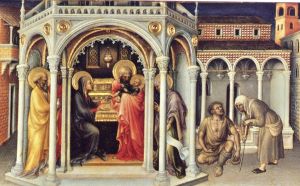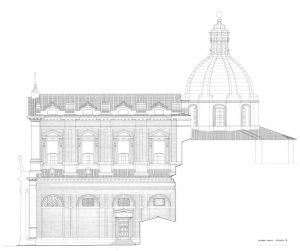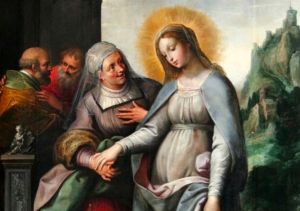
don Giuseppe Nespeca
Giuseppe Nespeca è architetto e sacerdote. Cultore della Sacra scrittura è autore della raccolta "Due Fuochi due Vie - Religione e Fede, Vangeli e Tao"; coautore del libro "Dialogo e Solstizio".
Loving enemies and turning the other cheek: whyever?
Beatitudes of role reversal
From «Master» to «Lord», ‘Word’ that realizes
Presentation of the Lord
Jesus in the Synagogue, to return to the Father's Dream
Wedding at Cana: between water and wine... desolation or love
Epiphany: more adventure is needed
Christmas: Easter. Breathing for me
COMPLEXITIES OF EXISTENCE (by Francesco Giovannozzi, psychologist and psychotherapist)
The complexities of existence.
Life is not always easy and the complexities of existence have always existed; they accompany us along the path of our daily lives.
In times gone by, it was often the family doctor who listened to them and associated them as related to the health of his patients and gave them advice.
When, on the other hand, the difficulties were of an ethical nature, people turned to the priest who, through accompaniment and confession, gave suggestions on how to redeem themselves.
Later, with the discovery of psychology in its various forms, people became concerned with human problems. The figure of the psychologist in the broad sense or the psychiatrist joined the previous figures. As far as the field of the psychiatrist is concerned more specifically, the problems are not visible illnesses.
People who are afflicted by life complications are not patients in the usual sense. They can be normal, productive people - as normal as one can be in our community.
Generally, these daily contrarieties may concern interpersonal relationships, the way one works, performance issues... but also the issue of living honestly, in line with one's principles and personal beliefs. Then there are the contrarieties of practical life, which can often accentuate the others.
A lot also depends on our typical behaviours with which we defend ourselves or construct our way of life, and which were formed at an early period - unconsciously imitating people who had meaning in our lives (the so-called character, very succinctly).
Jung argues that the child's unconscious depends on the parental unconscious.
Almost always in my long professional practice I encountered this construct, and I had to struggle to make people understand that it was the parents who triggered the behaviour.
Often when I encountered parents who did not want to accept certain responsibilities, the latter would resort to excuses that did not hold up in any way.
In relationships between individuals, the most annoying issue concerns how we experience our affections.
There are aggressive people who seek people to dominate. There are those who exploit the other (the unwary); and so on.
In love relationships, one has to pay attention to how each one stands towards the other. Let us give some examples.
A woman who suffers because of her spouse who hinders her every development (or vice versa) must understand or be helped to understand that she has somehow sought this situation, and that it is only by finding confidence in her own possibilities and ability to manage herself that she will find relief from her pains.
Otherwise, i.e. if he does not discover his own potential, not even by separating will he solve his problems - because he will unconsciously seek the same kind of spouse.
Only people who are able to respect each other's needs and interests are capable of adult love. We often confuse our own desire with that of the other.
How many times in counselling with couples have I encountered this.
In job difficulties we often find people who move from one job to another because they are not satisfied with the lack of recognition. It may be, for example, an individual with grandiose ideas about his or her aptitudes who has to seek admiration in the work environment .
Then there are people who do creative work and feel that they do not produce as they would like. Here we are often faced with an unachievable perfectionism. Often such individuals are unable to admit that they have limits, and are confronted with their real capabilities.
It then happens that many people turn to an analyst because although they do not have a form of depression, they are not happy with themselves.
In his Psychoanalysis of Contemporary Society, Erich Fromm argues that consumerism leads us to an 'alienation from self'. By 'alienation' he means that which in principle belongs to man and then becomes foreign to him - eventually dominating us.
We must be as others want us to be.
Advertising and fashion itself also consciously influence us, and in this way if we do not conform we can feel backward.
We often get into conflict between our beliefs and the need to 'please' people.
Of course we do not have to be isolationists, but even here a proper balance 'saves' us, since repudiating certain fundamental tenets of our way of being does a lot of damage.
May the coming Christmas enlighten us, show us the way. Not infrequently, here too, we match current population trends, and often forget its true meaning.
Francesco Giovannozzi Psychologist-psychotherapist
Different Soul of Mary, in Visitation
Are we not perhaps all afraid in some way? If we let Christ enter fully into our lives, if we open ourselves totally to him, are we not afraid that He might take something away from us? Are we not perhaps afraid to give up something significant, something unique, something that makes life so beautiful? Do we not then risk ending up diminished and deprived of our freedom? (Pope Benedict)
Non abbiamo forse tutti in qualche modo paura - se lasciamo entrare Cristo totalmente dentro di noi, se ci apriamo totalmente a lui – paura che Egli possa portar via qualcosa della nostra vita? Non abbiamo forse paura di rinunciare a qualcosa di grande, di unico, che rende la vita così bella? Non rischiamo di trovarci poi nell’angustia e privati della libertà? (Papa Benedetto)
For Christians, volunteer work is not merely an expression of good will. It is based on a personal experience of Christ (Pope Benedict)
Per i cristiani, il volontariato non è soltanto espressione di buona volontà. È basato sull’esperienza personale di Cristo (Papa Benedetto)
"May the peace of your kingdom come to us", Dante exclaimed in his paraphrase of the Our Father (Purgatorio, XI, 7). A petition which turns our gaze to Christ's return and nourishes the desire for the final coming of God's kingdom. This desire however does not distract the Church from her mission in this world, but commits her to it more strongly [John Paul II]
‘Vegna vêr noi la pace del tuo regno’, esclama Dante nella sua parafrasi del Padre Nostro (Purgatorio XI,7). Un’invocazione che orienta lo sguardo al ritorno di Cristo e alimenta il desiderio della venuta finale del Regno di Dio. Questo desiderio però non distoglie la Chiesa dalla sua missione in questo mondo, anzi la impegna maggiormente [Giovanni Paolo II]
Let our prayer spread out and continue in the churches, communities, families, the hearts of the faithful, as though in an invisible monastery from which an unbroken invocation rises to the Lord (John Paul II)
La nostra preghiera si diffonda e continui nelle chiese, nelle comunità, nelle famiglie, nei cuori credenti, come in un monastero invisibile, da cui salga al Signore una invocazione perenne (Giovanni Paolo II)
"The girl is not dead, but asleep". These words, deeply revealing, lead me to think of the mysterious presence of the Lord of life in a world that seems to succumb to the destructive impulse of hatred, violence and injustice; but no. This world, which is yours, is not dead, but sleeps (Pope John Paul II)
“La bambina non è morta, ma dorme”. Queste parole, profondamente rivelatrici, mi inducono a pensare alla misteriosa presenza del Signore della vita in un mondo che sembra soccombere all’impulso distruttore dell’odio, della violenza e dell’ingiustizia; ma no. Questo mondo, che è vostro, non è morto, ma dorme (Papa Giovanni Paolo II)
Today’s Gospel passage (cf. Lk 10:1-12, 17-20) presents Jesus who sends 72 disciples on mission, in addition to the 12 Apostles. The number 72 likely refers to all the nations. Indeed, in the Book of Genesis 72 different nations are mentioned (cf. 10:1-32) [Pope Francis]
L’odierna pagina evangelica (cfr Lc 10,1-12.17-20) presenta Gesù che invia in missione settantadue discepoli, in aggiunta ai dodici apostoli. Il numero settantadue indica probabilmente tutte le nazioni. Infatti nel libro della Genesi si menzionano settantadue nazioni diverse (cfr 10,1-32) [Papa Francesco]
duevie.art
don Giuseppe Nespeca
Tel. 333-1329741
Disclaimer
Questo blog non rappresenta una testata giornalistica in quanto viene aggiornato senza alcuna periodicità. Non può pertanto considerarsi un prodotto editoriale ai sensi della legge N°62 del 07/03/2001.
Le immagini sono tratte da internet, ma se il loro uso violasse diritti d'autore, lo si comunichi all'autore del blog che provvederà alla loro pronta rimozione.
L'autore dichiara di non essere responsabile dei commenti lasciati nei post. Eventuali commenti dei lettori, lesivi dell'immagine o dell'onorabilità di persone terze, il cui contenuto fosse ritenuto non idoneo alla pubblicazione verranno insindacabilmente rimossi.



















